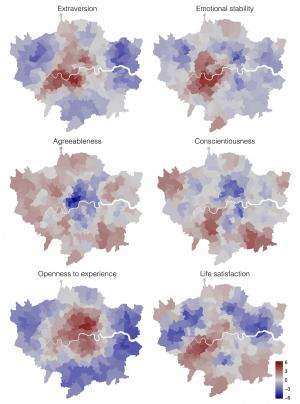Tired of London? Maybe you're living in the wrong place

"When a man is tired of London, he is tired of life," observed the writer Samuel Johnson in the eighteenth century. In fact, research published today suggests such a man may be merely living in the wrong postcode. A study of 56,000 Londoners found that a person's life satisfaction depends, at least in part, on whether their personality suits the place where they live.
Between 2009 and 2011, the BBC collected data from almost 590,000 people as part of its Big Personality Test. An international team of researchers has analysed data from the subset of 56,000 Londoners to examine how associations between personality and life satisfaction differed across the 216 postal districts of Greater London. The results are published today in the journal Proceedings of the National Academy of Sciences.
"It's very common for people to talk about where is the best place to live, but most research has tended to look at factors such as income and low crime rates, and only on a very broad geographical scale, failing to consider individual differences in personality," says Dr Markus Jokela from the University of Helsinki, Finland. "As a result, studies imply that all people would be equally happy in the same places. It's a one-size-fits-all conclusion that, as we show, is misleading because one's level of happiness is dependent on whether their environment is suited to their personality."
The researchers found geographical differences and clustering in levels of life satisfaction and certain personality traits. For example, people clustered around central and urban areas were the most open - and, to a lesser degree, the most extroverted - with levels decreasing when moving to outer regions. Areas of greater average openness also showed a mixture of neighbourhood characteristics, including higher population density and higher housing prices, higher ethnic and religious diversity, and higher crime rate. The findings support previous research showing that openness is associated with broad interests and tolerance for alternative lifestyles and ideas, and that these dispositions are often thought to characterize residents of densely populated urban areas.
The least agreeable areas were found in western central London, an area that has the highest crime rate, busiest pedestrian traffic, and some of the highest housing prices in the capital. The researchers believe this could be interpreted to support the popular notion that residents of big cities tend to be less considerate towards other people.
The researchers found higher levels of life satisfaction in the most affluent regions of London and pockets of low life satisfaction in northwest, northeast, and south London. As with previous studies, the researchers found that people who were most emotionally stable and/or extroverted tended to have the greatest life satisfaction - and this was not affected by the area in which they lived.
Importantly, the researchers also showed that the strength of associations between personality traits and life satisfaction were dependent on neighbourhood characteristics. For example, in postal districts with higher extraversion, lower agreeableness and lower conscientiousness, people tended to show greater life satisfaction if they were more open to new experiences.
In areas that reported lower levels of life satisfaction, the most agreeable and conscientious tended to fare best - to be the most satisfied - suggesting that these personality traits are more important determinants of life satisfaction for individuals living in less favourable environmental circumstances.
Overall, the analysis of personality-neighbourhood interactions showed that openness to experience, agreeableness, and conscientiousness were differently associated with life satisfaction of individuals depending on their residential location and specific characteristics of those locations. This suggests that finding the best place to live will depend on the match between individual dispositions and neighbourhood characteristics.
"Together, these findings not only add to our understanding of the ways in which features of our personalities relate to our physical environments, but they also provide potentially useful information for choosing a place to live," says Dr Jason Rentfrow from the Department of Psychology and a Fellow of Fitzwilliam College at the University of Cambridge. "Granted, most people don't have the luxury of complete control over where they live, but given their budgets, people can decide whether it's more important to live in the centre of town, where daily life is vibrant and accommodation is small, or further out where daily life is slower but space is more plentiful. Making the decision that fits with your personality could have an effect on your overall life satisfaction."
More information: BBC Big Personality Test - ssl.bbc.co.uk/labuk/experiments/personality/
Paper: Jokela, M et al. Geographically varying associations between personality and life satisfaction in the London metropolitan area. PNAS; 12 Jan 2015. www.pnas.org/cgi/doi/10.1073/pnas.1415800112

















